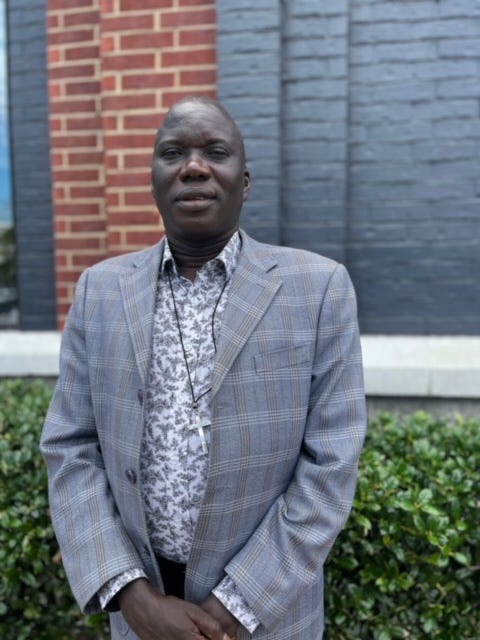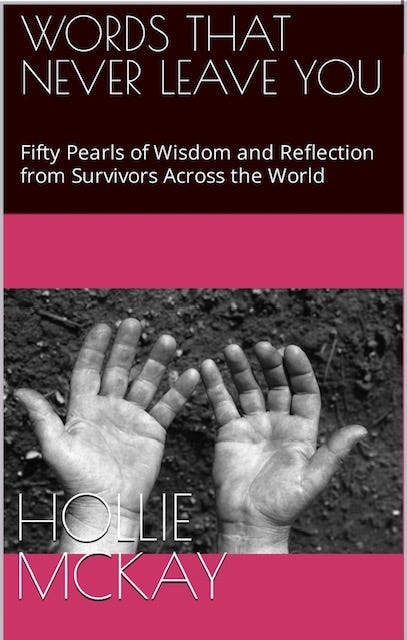Words that Never Leave You: “Imagine you are driving and realize you are going in the wrong direction. Do you continue going down that road? Or do you turn around and find a better way?”
Part Fifteen in an ongoing series from Hollie's book "Words That Never Leave You: Fifty Pearls of Wisdom and Reflection from Survivors Across the World."
For Bishop Abraham Yel Nhial, who serves at the Aweil Diocese of the Episcopal Church of South Sudan, life has come full circle. As a child, he was entangled in the brutal civil war in Sudan, forced to flee his home and travel on foot in search of safety, persistently under enemy fire from the predominantly Muslim population further north.
Abraham’s resilience is unwavering. After all, it has been a long and rocky road marred by endless conflicts and chaos for the Bishop to be here today. First, the civil war ignited in his birthplace Sudan in 1983, forever altering the lives of Sudanese boys and men. Government forces in the nation’s north fought against the southern rebel outfit, the Sudanese People’s Liberation Army (SPLA), forcing thousands of boys into the somber realm of its ranks.
The violence intensified in the late 1980s, driving more than twenty thousand boys – as young as six – away from their families. The threat of being abducted or killed as a child soldier loomed heavy on the children, prompting more than twenty thousand of them to walk more than one thousand miles. Over eighteen months, the frightened boys crossed three countries without adult support or aid, moving through Ethiopia and then on to the Kakuma refugee camp in Kenya.
The dangerous, heat-stricken route claimed at least half of the lives. Hundreds drowned crossing Ethiopia’s bloated Gilo River. Crocodiles or hippos slew hundreds more, and thousands were shot dead due to the lurking enemy fire of government soldiers. The boys who made it to the tattered tents became known as the Lost Boys of Sudan. Many came of age in the resource-drained, arid grounds without parents or a place to call home and barely a scrap to eat.
Today, fighting continues to engulf Abraham’s homeland of the still-young South Sudan. Furthermore, his state of Aweil lies in the northwest pocket of South Sudan, bordering the region of Darfur, Sudan.
Disputes over land, livestock, water access and natural resources run rife. Families flee from place to place in panic, squabbling to survive another day as medical clinics shutter, store shelves and homes are wiped clean and looted, and women are subject to rape and sexual violence.
Does anyone care? These wars seem forgotten. These countries are too. War crimes are officially filed away to collect dust, and everyone is supposed to move on from them. But not everyone is giving up.
Abraham’s office is nothing more than a decrepit hut with a dirt floor in Aweil. He hinted at the laziness of top brass in international fields, abandoning the matter out of frustration, rather than working diligently for a solution. He believed the answers come down to vetting, protocols and working with the right people. Abraham listed many ways the international community could assist Aweil, from planting drought-resistant Moringa trees – highly valued for their edible parts and water purification – to helping the masses of displaced live beyond the “pieces of plastic” used for shelter.
“Imagine you are driving and realize you are going in the wrong direction,” Abraham emphasizes. “Do you continue going down that road? Or do you turn around and find a better way?”
Abraham’s passage, at that moment, seemed like an encapsulating metaphor for life. The fear of diversion even when we know that the track we are on is not right, but simultaneously acknowledging the possibilities that await us when we dare stop and take the turn.
PURCHASE YOUR COPY OF “WORDS THAT NEVER LEAVE YOU” TO READ MORE REFLECTIONS AND ANECDOTES
** Short read of meaningful lessons gleaned from the ordinary forced to become extraordinary
For speaking queries please contact meta@metaspeakers.org
I am also available for a select number of private coaching sessions for those wishing to write a book or venture into the foreign journalism space. Please contact directly for rates hollie@holliemckay.com
PLEASE CONSIDER A PAID SUBSCRIPTION TO THIS SUBSTACK TO KEEP INDEPENDENT JOURNALISM ALIVE.





